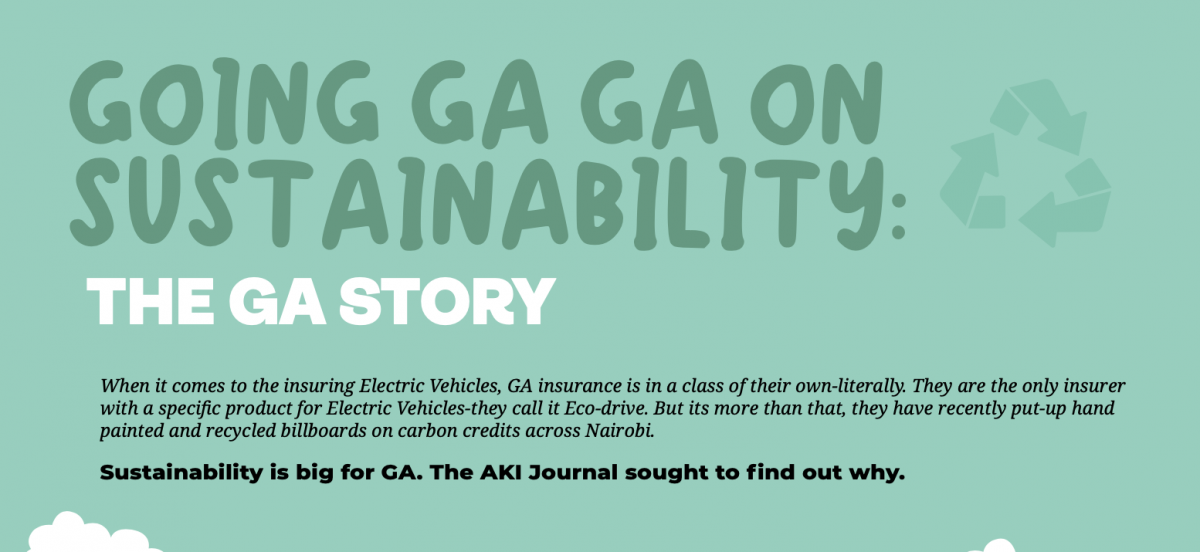News
THE GA STORY: GOING GA GA ON SUSTAINABILITY

What do you think the impact of EVs on premiums will be in the coming years?
Presently, premiums on electric vehicles (EVs) are slightly higher than those for internal combustion engine (ICE) vehicles. However, we expect that these premiums will decrease in the near future. As the local market develops better capacity for handling EVs and spare parts for the vehicles become more accessible, premium rates should correspondingly decrease.
A significant feature of EVs is their embedded telematics, which has notably reduced theft, particularly for two-wheelers. We are looking into leveraging telematics to reduce instances of fraud and lower claim administration costs. We hope to pass the benefit to consumers in form of lower premiums
What has your experience been so far with the product you rolled out in September 2023?
Since the launch, we have focused on market sensitisation through trainings and creating awareness of the GA Eco Drive cover through different channels. The cover has quickly gained traction, demonstrating GA Insurance’s ability to deliver exceptional value to our customers. We have all types of EVs in our books; Buses, cars, tuk-tuks, motorcycles, scooters and even bicycles.
So far, the experience has been very positive and customer feedback has been encouraging. We hope to gain a more comprehensive picture upon conducting the experience investigation at the first anniversary.
What are your thoughts on future trends of EV insurance in Kenya?
The future is indeed promising and green, we have led the way, we expect other insurers to follow suit.With more players, comes the downward pressure on premium rates.
Two wheelers will continue maintaining the lead and battery as a service gaining traction across the country. We also anticipate innovation on usage-based insurance products on EVs as they are telematics enabled.
How important is Sustainability to your business?
Sustainability is at the core of our long-term game plan. Our strategic initiatives are aimed at ensuring environmental, economic and social sustainability.
On the environmental front, we have been proactive in supporting the e-mobility sector with tailored solutions. Our carbon-neutral motor cover for electric vehicles (EVs) is just the beginning. We are also finalizing an extended warranty cover for EV batteries. These specialized risk transfer solutions aim to promote eco-friendly transportation options, significantly contributing to the reduction of greenhouse gas emissions and air pollution.
Economically, GA Insurance has struck a balance between profit-making and empowering our clients. Our diverse product offerings have fueled economic growth in the regions we operate in. For instance, during the 2024 long rains season that caused floods, we swiftly assisted our policyholders in recovering, thereby preserving jobs and production within the economy. We continuously review our premium rates to ensure they support sustainable long-term growth and the company’s ongoing viability.
Socially, our Corporate Social Responsibility (CSR) initiatives are channeled through the Bhagwanji Raja Charitable Foundation. These purpose-driven social programs have redefined corporate philanthropy, demonstrating the vital role businesses can play in fostering a more equitable and sustainable world. Our GA Education Scholarship program supports over 100 needy students with comprehensive aid, including career counseling and financial support. Additionally, our GA Health Support Program, in partnership with Kamili Organization, funds training for nurses and supports over 7,700 patients across multiple mental health clinics in Kenya, reflecting our commitment to community well-being.
What other sustainability initiatives/activities are you undertaking? (This could be to ensure a sustainable business or also aligned to ESG initiatives)
For the past 12 years, GA Insurance has been dedicated to supporting over 3,000 women from the Kibera slums through the Kipepeo Trust Foundation. This self-help group focuses on recycling waste paper, with GA providing shredded paper for upcycling into decorative cards and other products. This initiative not only reduces environmental pollution but also offers sustainable livelihoods for these women. We further assist by marketing their products and buying them at premium prices.
In the month of May 2024, our staff participated in a tree-planting event at Osupuko Primary School, aligning with Kenya’s 30% tree coverage initiative, with each tree representing a motor insurance policy purchased from us, involving our customers in our ESG efforts. We are committed to annual tree planting across Kenya, addressing deforestation and benefiting communities with the ecosystem services provided by trees. Additionally, our iconic billboards now feature a special cement-based paint called Celour, which captures up to 20% of its weight in CO2, equating to the daily absorption rate of an average tree.
GA is also committed to sustainability through digitisation. Our digitisation efforts include digital claims processing, online policy management, mobile applications, and automated customer service, all aimed at reducing paper use and enhancing efficiency. Additionally, we train policyholders on risk management and mitigation strategies through workshops, online resources, personalized risk assessments, emergency preparedness training, and regular communication, ensuring both our business and our clients’ operations run sustainably and resiliently.
What do you think the overall impact of Sustainability on the insurance sector will be?
We think that the impact of Sustainability in the insurance industry will be significant and multifaceted.
We are currently witnessing how sustainability is driving innovation in the insurance sector, prompting insurers to redesign their products and processes to ensure support for the green initiatives. Going forward, we expect insurers to scale their Internal Focus on the sustainability journey. This involves adopting sustainable practices within their own operations, managing climate risks, and applying sustainability standards to their investments.
Pressure from clients, regulators, shareholders, and society at large drives insurers to consider ESG factors. Clients increasingly seek insurance providers that align with their values and demonstrate responsible practices.
Insurers play a leading role in understanding and managing climate-related risks, particularly as extreme weather events become more frequent. We will continue to assess the impact of these events on our balance sheets and develop strategies to mitigate these risks.
In summary, sustainability considerations will reshape the insurance industry, drive innovation, responsible practices, and enhanced risk management.
What are the unique risks and considerations when dealing with EV insurance?
The Internal Combustion Engine (ICE) and Electric Vehicles face relatively similar risks when under use on the road like accidents, theft and fire etc. However, like all inventions or new technologies, EVs have certain special unique features and hence the exposure to unique risks.
- First is an elevated risk of fire. Battery-related incidents are the most common cause of EV fires. These incidents can be attributed to manufacturing defects from factory production level, battery degradation, improper use, collisions, overcharging and extreme temperature conditions.
- Secondly, the risk of flooding. Submersion in water can cause permanent damage to an EVs electrical system and its battery components.
- Third, the high voltage or high-tension charger and electrical system pose a danger of electrocution, not just to the user or owner, but also to third parties sharing facilities where EVs are being powered.
- Lastly, most EVs are interconnected and come with autonomous driving capabilities. This exposes them to cyber-attacks.
As an underwriter, we scan out all the hazards and projected risks for the benefit of our clients. With the help of our in-house engineers, we have been able to identify risk indicators to help minimize our exposure. We continue to have technical engagements with the original equipment manufacturers (OEMs) and accredited dealers to improve on our risk mitigation strategies and plans.
What challenges exist in insuring EVs?
At the moment, there is limited expertise in the local market to repair EVs. Availability of spare parts, especially the electronic components is also constrained. Most dealers have just-in-time stock management philosophy for electronic components of EVs such as motor and battery. These parts are imported on demand, exposing insurers to foreign exchange risks. A volatile and fluctuating forex market can render the acquisition and logistics unattainable and subsequently unsustainable.
Secondly, there is no demonstrated technical capacity to recycle batteries locally. This in turn projects the cost of claims upward as we are not able to salvage damaged batteries. Furthermore, improper disposal of batteries has associated environmental pollution concerns.
Lastly, we have experienced a steady increase in towing costs for EVs in case of an accident. We have set guidelines that EVs to be towed using low-bed carriers only, since batteries are located in the undercarriage. Low-bed carriers come at a higher cost.
The Government is keen on pushing the use of EVs in the country, what incentives have they put in place to support this policy?
There has been incredible goodwill from the State. The Kenyan government has embraced E-mobility as a critical component of sustainability initiatives. Â The state plans that out of the total vehicles registered, 5% will be electric cars by 2025. The President has been at the forefront in pushing this agenda. Recently while on official duty to India, he indicated the government’s intention is to replace two million petrol motorbikes with electric motorbikes.
Further, the Government has put in place subsidies to accelerate industrialisation and growth of clean transport. Electric vehicles assembled in the country are exempt from the 25 percent import duty on such models that are shipped in fully built from overseas. They are also shielded from the 25 percent excise duty that applies to fully-built imports.
The Government has also rolled out policies and regulations to support adoption of electric vehicles. Energy and Petroleum Regulatory Authority (EPRA) recently published regulatory guidelines that would require installation of charging infrastructure system after every 25 kilometres along major highways. Similar progressive laws are outlined in the Battery Swapping Guidelines, and Tax Law Amendments can further unlock opportunities in the electric mobility space.


